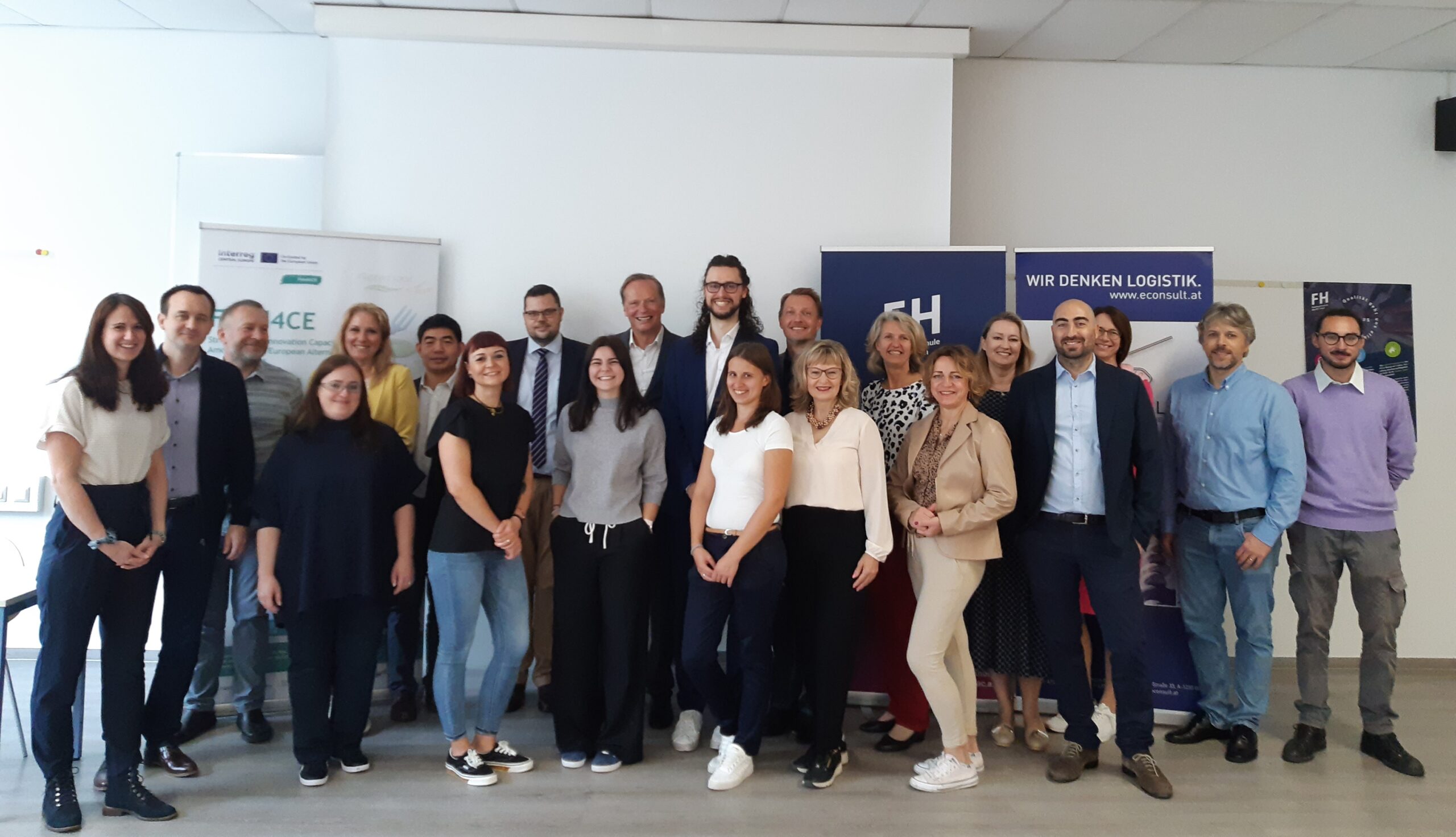On 26th and 27th September, the project meeting of the Food4CE project was held in Vienna (Austria). The Consortium, hosted by Austrian partners UAS BFI Vienna and ECONSULT, gathered in the beautiful setting of the Austrian capital to discuss the project’s progress, jointly analyse the goals achieved and, most importantly, to prepare for the next important steps that will bring local Innovation Hubs, the Knowledge Transfer Platform and the Matchmaking Platform to reality in the upcoming months.
During the first day of meeting, the partners were able to discuss the achieved tasks in the project, the progress of the five local Innovation Hubs that will be inaugurated in the coming months in the countries involved – Austria, Slovenia, Italy, Poland and Hungary – and share the best logistics practices of the AFNs analysed in the research.
It was a great opportunity to host Florian Weber, founder of Heavy Pedals, one of the pioneers in Austria that has been offering cargo bikes for delivery services in Vienna since 2009 at the project meeting. Weber, interviewed by David Strauß (UAS BFI Vienna), explained to Food4CE partners the main challenges and opportunities of urban food logistics, as well as the advantages of using sustainable means of transport. “There is a lot of potential for cargo bikes and, in general, for more sustainable urban logistics – said Florian Weber – but we are not close to the peak. It is time to take a step forward, because everyone will see the positive change”.
Urban food deliveries represent a challenge not only from a logistics but also from an environmental point of view. Making the process as efficient and sustainable as possible is therefore crucial, as it is enabling producers to evaluate greener alternatives and making consumers aware of the need to make more sustainable choices. All these are issues that the Food4CE Consortium needs to address to achieve the project’s main objective: to support Central European Alternative Food Networks (AFNs) through the exchange of good practices and the adoption of new technologies.
For this reason, the second day of the meeting was dedicated to learning about several real case demonstrations from various operators, who are bringing their sustainable innovations to city logistics in Vienna, and beyond.
DI Andrea Faast, representative from the Vienna Chamber of Commerce, presented the measures to support eMobility activated by the Vienna Chamber of Commerce and, in particular, the online eMobility guide, available since September 2021, which is continuously maintained and expanded, now covering all 9 provincial chambers. The Vienna Chamber of Commerce has also provided numerous public e-charging points, set up in so-called “Charging Areas”, in front of small and medium-sized companies. Stopping and parking are prohibited in these areas, except for the loading and unloading of vehicles, while companies can use the charging/unloading area to charge the battery of the company’s electric vehicle with green electricity. The results of the initiative are already evident: 1200-1600 charging processes by the companies located at the site within the 1st year; 25.7-32.0 thousand kWh purchased by local companies; 10-23 % of charging processes at the charging station by the local company. Finally, DI Andrea Faast presented two important pilot projects involving the city of Vienna: the Zero emission Transport pilot project and the LogPOINT pilot project. The aim of the pilot project Zero Emission Transport is to assess the operational feasibility of CO2-free deliveries to green commercial transport in Vienna’s 1st and 2nd districts with zero-emission vehicles. The LogPOINT pilot project focuses on sustainability and professional storage with cold storage and picking of organic food. As part of the project, a City Logistics Hub serves customers as a storage and transhipment centre for regionally produced foodstuffs.
Further on, Hans Dechant, representative from Wiener Lokalbahnen, presented Wien Box, a network of white-label parcel lockers in Vienna – and later throughout Austria under the name of Next Box – offering an innovative approach to the city logistics with parcel lockers for deliveries. Customers can thus order food from local vendors or producers and have it delivered in refrigerated parcel lockers, with advantages in terms of cost, flexibility and sustainability.
Lastly, Herwig Brandstatter presented My flex box, the largest open 24/7 smart Locker network in Austria and the most advanced Out of Home platform in Europe, while Paul Brandstatter introduced Food4CE partners to Jumug, a solution of cargo scooters made in Vienna and used for last mile deliveries. From words to deeds, the partners were finally able to see and test the solutions presented, climbing aboard an innovative cargo bike for last mile deliveries, and testing the operation, from depositing a parcel to its collection, of a parcel locker.
The meeting in Vienna was a great opportunity for the Food4CE Project and its developments, which will go live in the upcoming months with the launch of the local Innovation Hubs, the Knowledge Transfer Platform and the Matchmaking Platform.
Stay tuned to get a glimpse of the project meeting and its use case demonstrators, which will be available soon.
Finally, special thanks to Food4CE Austrian partner UAS BFI Vienna and ECONSULT for their hospitality and warm welcome in Vienna!
